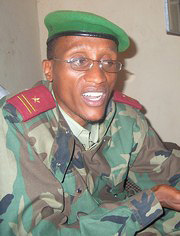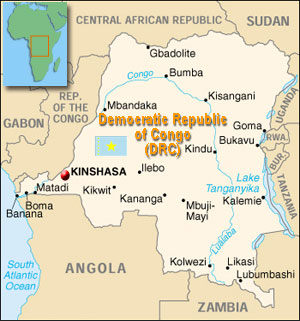|
KINSHASA, 27 Nov 2006 (IRIN) - Between 15,000 and 20,000 people have fled the eastern town of Sake in the Democratic Republic of Congo, which was seized from army dissidents by United Nations and government troops on Monday, the commander of the 8th Military Region said.
"We can confirm that we have taken control of the entire town of Sake and we are mopping up," Col Delphin Kahindi, the officer, said.
The UN Mission in the Congo's (MONUC) military spokesman in Goma, Maj Ajay Dalal, said the UN used combat helicopters and ground troops in the recapture of Sake. Gen Laurent Nkunda was supported by army dissidents from the 81st and 83rd brigades who also threatened to capture Goma. These troops have fought several battles against loyal government troops in North and South Kivu provinces since 2004. On Monday, the MONUC spokeswoman in Goma, Jacqueline Chenard, said UN troops and the army had neutralised the threat to Goma.
 |
| Dissisent arny General Laurent Nkunda whose troops lost Sake on Monday to army and UN troops |
"The blue helmets of MONUC had to open fire to ward off a move towards Goma," Chenard said.
The head of the UN Office for the Coordination of Humanitarian Affairs (OCHA) in Goma, Patrick Lavand'Homme, said gaining access to the displaced was difficult. "We are ready for a humanitarian response but as long as there is no security, the humanitarians cannot enter this zone," he said.
The displaced had fled in two different directions. Lavand'Homme said a small group had reached the outskirts of Goma, capital of North Kivu Province, and slept outdoors on Saturday night. They have now been housed in schools and churches.
A second group of displaced persons fled by canoe towards Bulenga Peninsula and Minova in neighbouring South Kivu Province. It was not known how those people who reached Bulenga were faring, Lavand'Homme said, because of poor communications. However, he said 1,000 had reached Minova and spent their first night outdoors.
He said a team that made a quick visit to Sake on Sunday found it empty.
There was no immediate explanation for Nkunda's attack. He has been relatively inactive since his forces captured Bukavu, the provincial capital of South Kivu Province, in June 2004 under the pretext of defending Congolese Tutsis from a massacre. Loyalist Congolese troops later ousted Nkunda's.
ei/oss/mw
Related articles
- • DR Congo Asks Rwanda to Turn Over M23 Rebel Leaders (July 26, 2013)
- • Thousands of Women March Against M23 Rebels in Kinshasa (November 24, 2012)
- • DR Congo, Rwanda Sign Pact to Fight Rebels in Eastern Congo (July 15, 2012)
- • Kagame Is A Problem for The U.S. and The U.K. (June 23, 2012)
- • UN Report Accuses Rwanda of Supporting Bosco Ntaganda Rebels (May 28, 2012)
- • Kabila, Army Chief of Staff head to eastern Congo to deal with defectors (April 10, 2012)
- • DR Congo Government Warns Bosco Ntaganda He May Face Justice (April 6, 2012)
- • Tshisekedi Says He Won, Can He Prove It? (December 17, 2011)
- • Kabila Confident He Will Win Re-Election (October 18, 2011)
- • Security Council extends mandate of UN mission in DR Congo (June 28, 2011)
- • Rights Groups: Strengthen Civilian Protection Before Elections (June 9, 2011)
- • UN Sanctions FDLR Leaders, CNDP Rebel Commander Integrated into Army (December 2, 2010)
- • UN launches patrols to head off rebel violence during holiday season (December 1, 2010)
- • UN Report: CNDP, Congolese Soldiers Involved in Illegal Mining Operations (November 30, 2010)
- • Congo Defense Minister Rejects UN Allegations against Army (October 17, 2010)
- • Rebel leader presumed responsible for mass rape arrested (October 5, 2010)
- • UN DR Congo Report Exposes Grave Crimes (October 1, 2010)
- • UN says peacekeepers 'failed' DR Congo rape victims (September 7, 2010)
- • UN Defends Inaction on Mass Rapes in Eastern Congo, Government Missing in Action (August 26, 2010)
- • Two Suspects Arrested in Attack on MONUSCO Base (August 20, 2010)
- • Ban Ki-moon deplores deadly attack against blue helmets in North Kivu (August 18, 2010)
- • Ban Ki-moon inaugurates new phase of UN mission in DR Congo (July 1, 2010)
- • Congo Celebrates 50th Anniversary of Independence (June 30, 2010)
- • Top UN envoy bids farewell to first batch of blue helmets leaving DR Congo (June 16, 2010)
- • Veteran United States diplomat appointed to top UN post in DR Congo (June 9, 2010)
- • Top UN officials urge inquiry into killing of Congolese human rights activist (June 3, 2010)
- • UN to reduce DR Congo peace force (May 28, 2010)
- • Security Council agrees to convert UN mission in DR Congo into stabilization force (May 28, 2010)
- • U.S. Official Sees Improvement in Africa's Great Lakes Region (May 26, 2010)
- • Back from DR Congo, Security Council set to review mandate of UN force (May 17, 2010)








